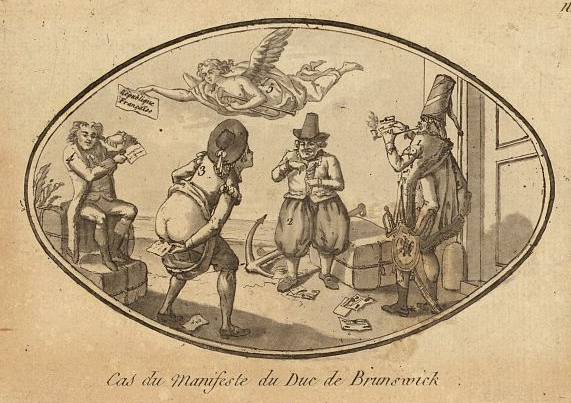Foreign Invaders Issue the Brunswick Manifesto
The Brunswick Manifesto was a threat issued by foreign invaders to French revolutionaries. It demanded surrender.
The manifesto heightened tensions between France and the invading forces, leading to increased hostilities. This document served as a catalyst for rallying French support against the invaders. Its inflammatory language and demands fueled nationalistic fervor among the French populace. The Brunswick Manifesto ultimately backfired, strengthening French resolve and unity in the face of external threats.
This pivotal moment in history showcases the power of propaganda and the unintended consequences of foreign intervention in domestic affairs.

Credit: www.loc.gov
Background Of The Brunswick Manifesto
The Brunswick Manifesto, issued during the French Revolution, aimed to intimidate the French people and restore the monarchy.
Origin Of The Brunswick Manifesto
The Brunswick Manifesto originated in 1792, commissioned by the Duke of Brunswick, commander of the Prussian army, to threaten the French citizens.
Significance Of The Brunswick Manifesto
- Instilled fear among the French revolutionaries
- Backfired and fueled patriotism
- Contributed to the radicalization of the revolution
Key Players Involved
Duke Of Brunswick
The Duke of Brunswick, Charles William Ferdinand, was a key player in the Brunswick Manifesto. As the commander of the Prussian army, he issued the manifesto in 1792, threatening to destroy Paris if the French royal family was harmed.
French Revolutionaries
The French Revolutionaries were another integral group involved in the Brunswick Manifesto. They were the target of the manifesto, as it was directed at the citizens of Paris, warning them of severe consequences if they harmed the royal family.
Content Of The Brunswick Manifesto
The Brunswick Manifesto, issued by the Duke of Brunswick in 1792, aimed to intimidate the French revolutionaries and restore the French monarchy. The proclamation led to significant reactions from both the French public and the international community.
French Public Response
The French public reacted with outrage and defiance to the Brunswick Manifesto. Citizens rallied together, displaying patriotism and a fierce determination to defend their country against foreign invasion. The manifesto further fueled the revolutionary fervor and solidified the resolve of the French people to resist the monarchy’s restoration.
International Community Response
The Brunswick Manifesto elicited mixed responses from the international community. While some European powers expressed support for the manifesto’s objectives, others condemned it as an act of aggression. The issuance of the manifesto heightened tensions across Europe, contributing to the escalation of the French Revolutionary Wars.
Reactions To The Brunswick Manifesto
The Brunswick Manifesto, issued by the Prussian and Austrian monarchs in 1792, had significant consequences that reverberated throughout Europe. This provocative declaration not only inflamed the French Revolution but also led to a series of military actions and political fallout that shaped the course of history.
Military Actions
The Brunswick Manifesto, threatening retribution against the French if the royal family was harmed, incited a strong backlash from the French revolutionaries. This led to the formation of the revolutionary armies and sparked the French Revolutionary Wars. The manifesto’s inflammatory language galvanized the French people, leading to increased support for the revolutionary cause and intensified military conflicts.
Political Fallout
The issuance of the Brunswick Manifesto further polarized the political landscape in France, deepening the divide between the revolutionaries and the monarchists. The manifesto solidified the revolutionary government’s position and contributed to the radicalization of the revolution, ultimately leading to the execution of King Louis XVI and the establishment of the First French Republic. Internationally, the manifesto strained diplomatic relations and heightened tensions between France and its neighboring countries, ultimately contributing to the outbreak of the Napoleonic Wars.
Consequences Of The Brunswick Manifesto
The Brunswick Manifesto was a proclamation issued by the Duke of Brunswick in 1792, during the French Revolution. Its main purpose was to threaten the French people with military action if they harmed King Louis XVI or his family. However, the manifesto had unintended consequences and a significant impact on subsequent events in France and Europe.
Historical Interpretations
The Brunswick Manifesto has been interpreted in different ways by historians over the years. Some view it as a major blunder that provoked the French people and led to the radicalization of the Revolution. Others argue that it was a calculated move by European powers to contain the spread of revolutionary ideas and protect the old order.
Regardless of the interpretation, the Brunswick Manifesto marked a turning point in the French Revolution and European politics. It demonstrated the willingness of European powers to intervene in the affairs of other countries and sparked a wave of nationalism and anti-foreign sentiment in France.
Influence On Subsequent Events
The Brunswick Manifesto had a profound influence on subsequent events in France and Europe. It contributed to the radicalization of the Revolution and the rise of the Jacobins, who were determined to defend France against foreign invaders at any cost.
Furthermore, the manifesto led to the formation of the First Coalition, a military alliance of European powers against France. This coalition would wage war against France for over two decades, leading to the Napoleonic Wars and the collapse of the old order in Europe.
In conclusion, the Brunswick Manifesto was a pivotal moment in European history that had far-reaching consequences. Its legacy can still be felt today in the form of nationalism, anti-foreign sentiment, and the balance of power in Europe.

Credit: en.wikipedia.org
Legacy Of The Brunswick Manifesto
The Brunswick Manifesto, issued during the French Revolution, holds a unique place in history. When compared to other manifestos, it becomes apparent that it shares certain characteristics with contemporary documents while differing significantly from other declarations.
Contrast With Other Declarations
The Brunswick Manifesto stands in stark contrast to other declarations of its time, such as the Declaration of the Rights of Man and of the Citizen. While the latter emphasized the fundamental rights of individuals, the Brunswick Manifesto aimed to intimidate and threaten the French revolutionaries, showcasing a distinctly aggressive tone.
Similarities With Contemporary Documents
Despite its aggressive nature, the Brunswick Manifesto shares similarities with contemporary documents, such as the modern-day open letters and public statements issued by political figures. These documents often serve to convey a message or make a call to action, aligning with the purpose of the Brunswick Manifesto.
Comparison With Other Manifestos
Modern Relevance: The Brunswick Manifesto, issued in 1792 during the French Revolutionary Wars, still holds significance in today’s geopolitical landscape.
Impact On International Relations
The Brunswick Manifesto’s threat against French civilians impacted international relations by escalating tensions.
Lessons For Diplomatic Strategies
The manifesto serves as a reminder to diplomats of the potential consequences of inflammatory rhetoric.

Credit: time.graphics
Conclusion
The Brunswick Manifesto was a pivotal moment in history, leading to increased tensions and ultimately the outbreak of war. Its impact on foreign relations and the French Revolution cannot be understated. Understanding the context and consequences of this document is crucial to comprehending the complexities of 18th-century European politics and warfare.




